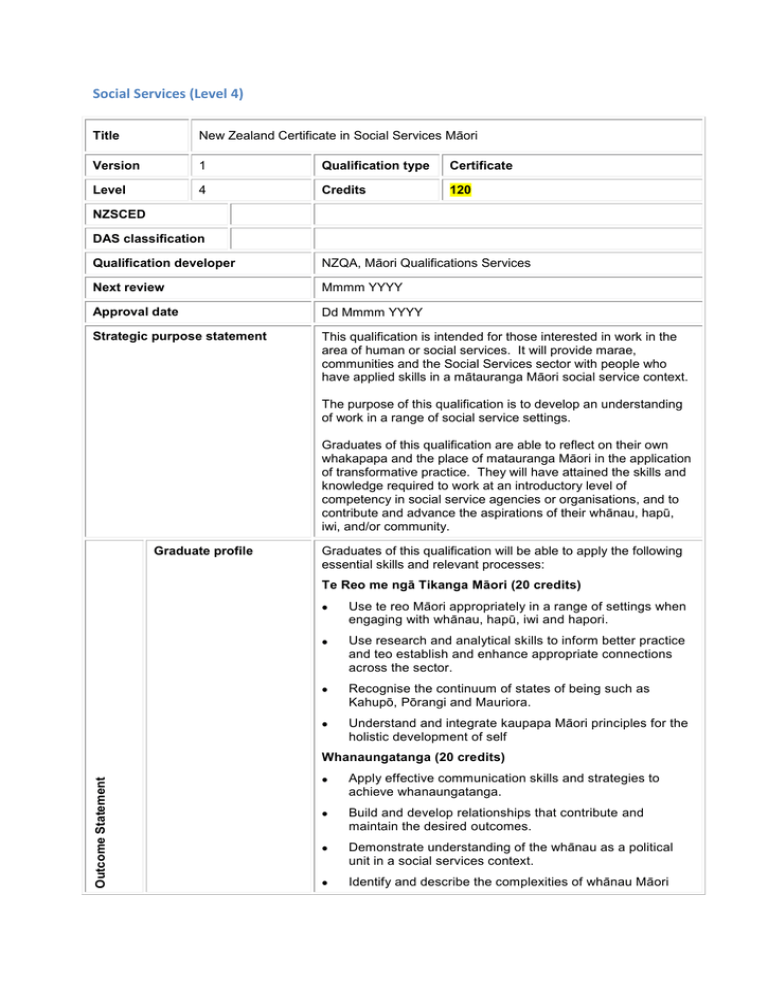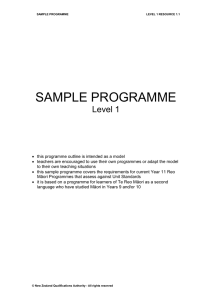New Zealand Certificate in Social Services Māori (Level 4) 120 credits (DOCX, 26KB)
advertisement

Social Services (Level 4) Title New Zealand Certificate in Social Services Māori Version 1 Qualification type Certificate Level 4 Credits 120 NZSCED DAS classification Qualification developer NZQA, Māori Qualifications Services Next review Mmmm YYYY Approval date Dd Mmmm YYYY Strategic purpose statement This qualification is intended for those interested in work in the area of human or social services. It will provide marae, communities and the Social Services sector with people who have applied skills in a mātauranga Māori social service context. The purpose of this qualification is to develop an understanding of work in a range of social service settings. Graduates of this qualification are able to reflect on their own whakapapa and the place of matauranga Māori in the application of transformative practice. They will have attained the skills and knowledge required to work at an introductory level of competency in social service agencies or organisations, and to contribute and advance the aspirations of their whānau, hapū, iwi, and/or community. Graduate profile Graduates of this qualification will be able to apply the following essential skills and relevant processes: Te Reo me ngā Tikanga Māori (20 credits) Use te reo Māori appropriately in a range of settings when engaging with whānau, hapū, iwi and hapori. Use research and analytical skills to inform better practice and teo establish and enhance appropriate connections across the sector. Recognise the continuum of states of being such as Kahupō, Pōrangi and Mauriora. Understand and integrate kaupapa Māori principles for the holistic development of self Outcome Statement Whanaungatanga (20 credits) Apply effective communication skills and strategies to achieve whanaungatanga. Build and develop relationships that contribute and maintain the desired outcomes. Demonstrate understanding of the whānau as a political unit in a social services context. Identify and describe the complexities of whānau Māori relationships. Demonstrate mana protecting and mana enhancing practices in working with those experiencing violence, abuse, neglect, menal health and addicion related problems as well as their extended whānau, hapū, iwi or hapori. Te Tika me te Pono (20 credits) Engage in reflective practice to enhance and achieve positive outcomes within the sector. Develop and implement an ethical framework for professional practice. Describe the history and evolution of social work and its impact on community work in Aotearoa/New Zealand (including Wātene Māori). Demonstrate understanding of the articles of Te Tiriti o Waitangi, the role of government and the main legislation relevant to social practice. Develop an understanding of bicultural and principled approaches to social services work. Manaakitanga (20 credits) Interact in a socially and culturally responsible manner. Promote self-care and understand the importance of tapu and noa processes and states. Use basic understanding of social practice responses in the manaaki of those affected by violence, abuse, neglect, mental health and addiction. Tino Rangatiratanga (20 credits) Explore Māori models of leadership to inform decisions and choices Develop an understanding of mātauranga Māori perspectives of Human Development across the life span and the roles, responsibilities of ‘ages and stages’ Whānau Ora 20 credits) Education pathway Explain the historical context of the development of Whānau Ora as a Government Policy for Social Services. Explain how te Tiriti o Waitangi supports the concept of Whānau Ora pertaining to Social Services... Understand ethical boundaries and professional standards within a Social Services context This is an introductory qualification that leads on to the New Zealand Diploma in Social Services Māori (Level 5), New Zealand Diploma in Whānau Ora (Level 5) New Zealand Diploma in Tiaki Kuia, Koroua, New Zealand Diploma in Social Services (level 5), New Zealand Certificate in Suicide Prevention (Level 5), New Zealand Diploma in Child Protection (Level 5) New Zealand Certificate in Addiction Studies Level 5, New Zealand Certificate in Youth Development (Level 5) Employment pathway Holders of this qualification will have the skills and knowledge required to work in formal and informal roles in the Social Services sector, such as: Support workers, Peer support, Community health workers, Age Concern support, Volunteers that may lead to employment, Care-givers, These roles may within government agencies, private and marae-based organisations. Whānau, hapū, iwi/community pathway This qualification provides a pathway for those who want to work effectively in Māori communities. Graduates of this qualification will: Support and assist whānau, hapū, iwi and hāpori to encourage whānau to make positive decisions and choices that would meet their social needs and future aspirations based on kaupapa Māori principles. The Headings: Te reo me ngā tikanga Māori: Acknowledges te reo Māori as the primary vehicle for expressing and transmitting Māori knowledge, values, and tikanga. It also signifies the importance of tikanga Māori when interacting with Māori in a Social Services context, and acknowledges that support of Māori includes knowledge of their identity, their kawa, and tikanga and practices associated with them. Whanaungatanga: Ensures the prominence of relationships being based on respect, integrity and understanding between the Māori person, their whānau and those offering care and support in a Social Services context. Te Tika me te Pono: Ensures important aspects that relate to kawa and tikanga; legal obligations and compliance issues, systems and procedures, ethics, and acting in a way that is socially and culturally responsible are adhered to. It also looks into how these tools can be utilised in the practice of the professional to achieve the best outcomes for whānau. Manaakitanga: Signifies as fundamental, the care of the Māori person, their whānau, hapū and iwi through the expression of mana-enhancing behaviors and practices within a Social Services context. It also identifies individual and whānau strengths, roles and responsibilities to empower Māori to achieve their dreams. Rangatiratanga: Empowerment and expression of world view that is distinctively and uniquely Māori when supporting Māori in a Social Services context.





